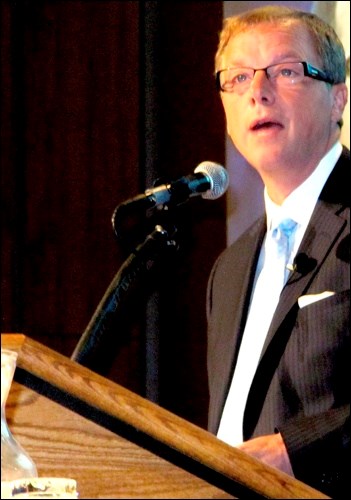Premier Brad Wall made good on his promise to provide revenue sharing equal to a full point of provincial sales tax at the 2011 Saskatchewan Urban Municipalities Association convention in Saskatoon Monday.
The premier also announced $22 million in flood prevention measures at the convention, an event well attended by mayors, councillors and administrators from around the province, including the Battlefords and other Northwest communities.
North Battleford Mayor Ian Hamilton, Battleford Mayor Chris Odishaw and their respective delegations heard Wall's announcement on revenue sharing at TCU Place. The program will mean Saskatchewan municipalities will receive record revenue sharing of $216.8 million, with $138.7 million of that going to urban municipalities.
While there had been some confusion among some municipalities about whether the money was specifically set aside for operating or capital expenses, Wall told reporters "there's no conditions on the money, there never has been with respect to revenue sharing the government has provided. We know there's an operating need on the part of the municipalities. That's probably the lion's share of the reason for them seeking a revenue-sharing deal from two different governments, but there's no condition on these particular dollars."
While the revenue sharing promise was kept by the province, it arrives a year late as the infamous plunge in potash revenues put a big hole in the 2010 budget and delayed implementation of Wall's pledge.
"Although we're one year late, we've kept the promise that we made," Wall said.
The premier also said a long-term capital funding program wasn't going to be in the coming budget, as the province was looking to keep its promises on both revenue-sharing as well as phase two of property tax reductions. The premier said the government also planned investments to reduce wait times, along with other items.
The Premier's announcement was welcomed by delegates, including Battleford mayor Chris Odishaw.
"Not only are we getting a bigger percentage but we are getting a full percentage of a bigger number," Odishaw said of the increased revenues coming his town's way.
"As we go forward, we know we can budget for a bigger windfall this year."
But his counterpart from North Battleford was hardly in the mood to jump for joy over the funding announcement.
"What we heard today, in my opinion, is pretty status quo", said Hamilton.
Beyond the announcement of $22 million towards flood prevention, Hamilton noted there were "no announcements that I heard other than saying 'this is the way it is and we'll look for opportunities in the future.'"
Hamilton said he was hoping for "long-term predictable, sustainable, and affordable funding for infrastructure in the long term. He did not breach that subject on our behalf at all."
The North Battleford mayor called the infrastructure issue "a huge file" on SUMA's agenda, noting municipalities are the ones directly responsible for delivering those services to the population.
Hamilton also did not foresee much impact of Wall's funding announcement on the City's forthcoming capital and operating budget deliberations, since the city anticipated all along the revenue sharing announcement would be made.
Allan Earle, President of SUMA, had a muted response of sorts.
"I would have liked to have heard that he had dug into his pocket and found another hundred million dollars," he said to reporters.
Still, Earle welcomed the premier's announcement on revenue sharing, noting it was not a surprise.
"We've known this was a promise the provincial government made a year ago, and we didn't have any reason to doubt that would be fulfilled," Earle said. "It's going to mean significant increased revenue for our cities, towns and villages."
Earle indicated he also wanted to see progress towards some sort of made-in-Saskatchewan infrastructure plan. He told reporters he hopes it will be in place by the next budget year.
In addition, the premier announced $22 million going towards flood-prevention measures in the province. According to the province, the program provides assistance in five areas including technical assistance to design flood protection works, building berms or diversion channels in communities and around rural residences and farmsteads, sandbagging and clearing snow around channels and culverts and testing of water supplies impacted by flooding.
The program will be led by the Saskatchewan Watershed Authority and the Ministry of Corrections, Public Safety and Policing, both of which will be working with both SUMA and the Saskatchewan Association of Rural Municipalities to finalize and implement the program, according to the province. Premier Wall the program is aimed at readiness for potential spring flooding this year.
Wall said the goal is "to be prepared for what might be coming. We don't want to alarm people. We don't know what the melt's going to be like, but we want to be prepared."




